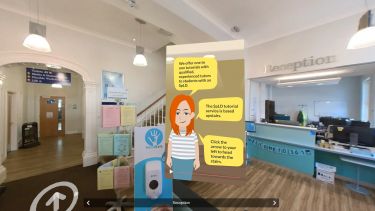Dyslexia & SpLD Support
An overview of the support available to University of ∫˘¬´”∞“µ students through the University's Disability and Dyslexia Support Service (DDSS) if you have dyslexia or another specific learning difference (SpLD).
The tutorials and resources listed on this webpage are provided by the SpLD Tutorial Service, part of the Disability and Dyslexia Support Service (DDSS).
The sessions are delivered by qualified, specialist tutors, who are accredited by , the association for dyslexia specialist tutors.
SpLD Tutorial Service one-to-one sessions
This is a specialist one-to-one tutorial service for students who have a formal identification of a specific learning difference (SpLD), like dyslexia. All SpLD students can use this service no matter what department they are in or what course they are taking at the University.
If you have an SpLD, you will be provided with a tutor who will work with you to identify and build on your strengths, improve academic literacy, and develop skills and strategies to help you to cope with any study difficulties you experience. The content of the session is flexible and student-led. You will see the same tutor every time where possible. This will be in a private room and online sessions are also available. The sessions may cover a number of different areas, including:
- time management and organisation
- research skills
- developing ideas
- note-taking
- writing: composition, accuracy, expression, structure
- reading
- planning
- communication
- memory and revision
- academic confidence
- grammar and punctuation
Student experiences of using the SpLD Service
To learn more about the SpLD service and how ∫˘¬´”∞“µ students have benefitted from using it, please go to this special interactive resource:
If you find the 360 degree experience disorientating and would just prefer to see the student experiences, you can do so at .
Bookable online How2 sessions
If you are waiting for an SpLD assessment, we also offer bookable one-to-one 30 minute tutorials. This service is called and is available during term time.
Online workshop for students who think they might have an SpLD
If you think that you might have an SpLD, we provide an online workshop. This workshop provides information on:
- What dyslexia is
- How SpLDs might impact your studies at university
- The support available to you
- The process for obtaining an assessment and accessing SpLD support
Online resources
In addition to our tutorials, we also offer a number of online resources. These include resources for students on placements, resources to develop online study skills and resources for students moving into employment. These resources are available here:
Neurodiversity Matters journal
An annual publication showcasing the work of the SpLD team and students. You can also find out more about the 301 Study Skills service and access a number of useful resources. A new issue will be released every January. If you would like to be involved in the next issue, please contact Eleanor Machin at e.machin@sheffield.ac.uk.
Download Issue 1 (.pdf, 2.5mb)
Further Information for Current Students
A full and detailed overview of the support available for current University of ∫˘¬´”∞“µ students with an SpLD, or who think they may have an SpLD, is available on our Dyslexia & SpLD Support Student Hub page:
Contact Information
If you have any questions about our Dyslexia and SpLD support for students, please contact Victoria Cartledge-Mann, SpLD Service Academic Director at v.e.cartledge-mann@sheffield.ac.uk

